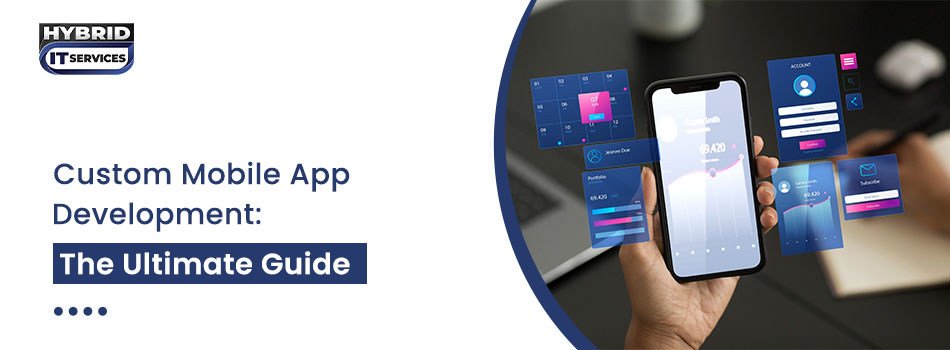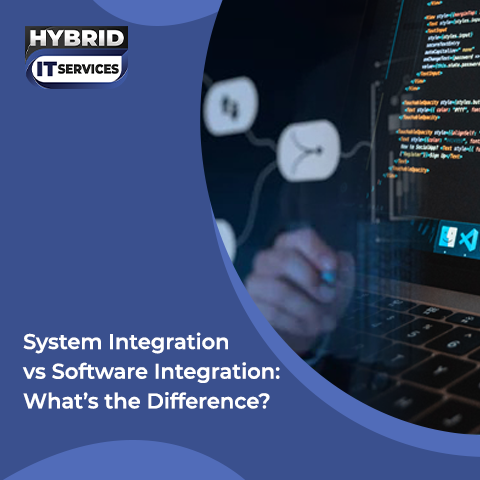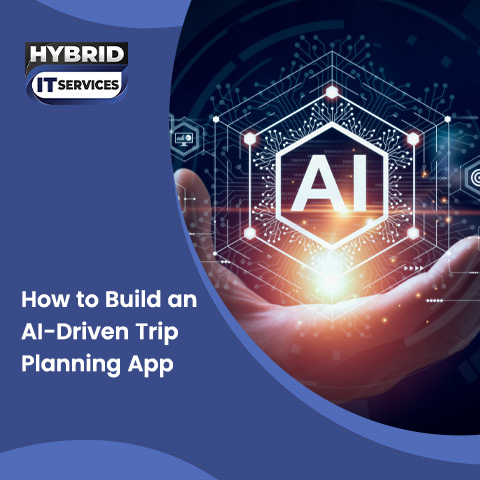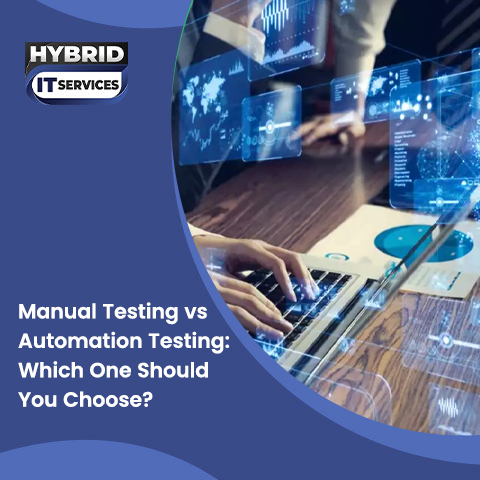Creating a custom mobile app design and development can be a game-changer for businesses. Entrepreneurs looking to engage with their audience in a more interactive and personal way. However, the journey from a mere idea to a fully functional app requires careful planning, understanding user needs, strategic marketing, and continuous improvement. Hybrid It Services will walk you through each critical step of custom mobile app development, providing insights to help you build a successful app that meets your goals.
Understanding Custom Mobile App
Custom mobile app development is the process of creating a mobile application specifically tailored to meet the unique needs and goals of a business or individual. Unlike generic apps that are built for a broad audience, custom apps are designed to solve specific problems, provide personalized experiences, and integrate seamlessly with existing systems and workflows. This process involves several stages, including planning, designing, developing, testing, and launching the app, all with a focus on the client's particular requirements.
Advantages of Custom App Development for Companies
Custom app development offers numerous advantages for companies, providing tailored solutions that meet specific business needs. Here are some key benefits:
Tailored Solutions:
Custom apps are built to address the specific needs and challenges of a business, ensuring a perfect fit with their operations and goals.
Enhanced User Experience:
Since the app is designed with the end-users in mind, it often offers a more intuitive and engaging experience compared to off-the-shelf solutions.
Competitive Advantage:
A unique app can differentiate a business from its competitors, offering features and functionalities that are not available in standard apps.
Scalability:
Custom apps can grow with your business. As your needs evolve, the app can be updated and expanded to accommodate new features and increased user demand.
Integration with Existing Systems:
Custom apps can be seamlessly integrated with other business tools and systems, improving efficiency and reducing redundancy.
Security:
Custom apps can be designed with specific security protocols that are tailored to the business's needs, offering higher protection against breaches and vulnerabilities.
You May Also Read: What are the Benefits of Having an App for a Business?
Varieties of Custom Applications
Custom applications are tailor-made software solutions designed to meet the specific needs and requirements of a particular business or individual. Here are some key varieties of custom applications:
Enterprise Apps:
These are designed for internal use within a company to streamline operations, improve communication, and enhance productivity. Examples include CRM systems, employee portals, and project management tools.
Consumer Apps:
Built for external users, these apps aim to engage customers, provide services, and enhance the user experience. Examples include e-commerce apps, customer service apps, and loyalty program apps.
E-commerce Apps:
These apps allow businesses to sell products and services directly to consumers through a mobile platform, offering features like product catalogs, shopping carts, and secure payment gateways.
Social Media Apps:
Custom social media apps can be developed to connect users in a niche community, offering specialized features and a unique user experience tailored to a specific audience.
On-Demand Service Apps:
These apps connect users with services they need in real-time, such as ride-sharing, food delivery, or home services. They usually include features like real-time tracking, notifications, and secure payments.
How to Develop a Mobile App?
Start with Marketing in Mind
Before diving into development, it's vital to consider your marketing strategy. Understanding how you will promote your app and reach your target audience can significantly influence the development process. Ask yourself:
- Who is your target audience?
- What problem does your app solve for them?
- How will you position your app in the market?
Developing a marketing plan early on helps you identify your app's unique selling points (USPs) and ensures that your development efforts align with your marketing goals. Conduct market research to understand your competition, and define a clear value proposition that sets your app apart.
Get to Know Your Target Users
Knowing your users is key to creating an app that meets their needs and exceeds their expectations. Conduct thorough user research to gather insights about your potential users' demographics, behaviors, preferences, and pain points. Techniques such as surveys, interviews, and user persona development can provide valuable information. Understanding your users will help you design features that are not only useful but also intuitive and engaging.
Develop a Fast-Track Prototype
In Process of Customized mobile app development, once you have a clear understanding of your market and users, the next step is to build a rapid prototype. A prototype is a preliminary version of your app that allows you to visualize its design and functionality.
Further, Tools like Sketch, Figma, or Adobe XD can help you create interactive prototypes without writing a single line of code. Prototyping enables you to test your ideas, get early feedback from users, and make necessary adjustments before investing in full-scale development.
Develop an MVP
A Minimum Viable Product (MVP) is a basic version of your app that includes only the core features necessary to solve the primary problem for your users. The goal of an MVP is to launch quickly with minimal resources while still providing value to your users.
By releasing an MVP, you can validate your concept, gather real user feedback, and iterate based on actual usage data. This approach helps you minimize risks and ensure that you are building a product that truly resonates with your audience.
Differentiate Your App
In a crowded app market, making your app stand out is essential. Focus on delivering a seamless user experience (UX) with intuitive navigation, appealing design, and fast performance. Unique and innovative features can differentiate your app from competitors.
Additionally, for custom built apps pay attention to branding elements such as your app icon, color scheme, and overall aesthetic to create a strong visual identity. Consistent branding across all touchpoints, including your website and social media, reinforces your app's image and helps build recognition.
Choose Your Distribution Path
Deciding how to distribute your app is a critical step. The two main platforms for mobile apps are the Apple App Store (for iOS apps) and Google Play Store (for Android apps). Each platform has its own guidelines and requirements, so it's essential to familiarize yourself with them.
You might also consider alternative distribution methods, such as offering the app on your website or through enterprise solutions for internal use. Choose the distribution model that best aligns with your target audience and business objectives.
Pay Attention to User Feedback
After launching your app, actively seek feedback from your users. Customer reviews, ratings, and direct feedback are invaluable for understanding what works and what doesn't. Use this information to make informed updates and improvements.
Engaging with your users shows that you value their input and are committed to providing a high-quality app experience. For custom built apps, regularly update your app to fix bugs, introduce new features, and enhance performance based on user feedback.
You May Also Read: How Can Custom Mobile App Development Boost your Business?
Understand the Cost of App Development
Understanding the cost of app development is crucial for budgeting and planning. Several factors influence the overall cost, including:
- Complexity of features: More advanced features like real-time updates, geolocation, or integrations with other services will increase development costs.
- Design requirements: Custom designs and animations can add to the cost.
- Platform choice: Developing for both iOS and Android typically cost more than focusing on a single platform.
- Development team: Hiring experienced developers, designers, and testers will impact your budget.
Research and get quotes from multiple development teams to understand the range of potential costs. Factor in ongoing expenses for maintenance, updates, and marketing to get a complete picture of the financial commitment.
Track Your Users Across Platforms
In today's multi-device world, users often expect seamless experiences across different platforms. Consider how your app will function on various devices, including smartphones, tablets, and desktops. Cross-platform development tools like React Native or Flutter can help you build apps that work across multiple platforms with a single codebase, saving time and resources. Ensuring a consistent and high-quality experience across all devices enhances user satisfaction and retention.
Revenue Models for Custom Apps
- In-App Purchases
- Subscription Model
- Advertising
- Freemium Model
- Paid Apps
- Affiliate Marketing
Obstacles in Custom App Development
Building a custom app can be expensive due to the need for specialized skills and resources. Custom app development is a complex process that can take a considerable amount of time from planning to launch.
Once the app is launched, it requires ongoing maintenance and updates to fix bugs, add new features, and ensure compatibility with new devices and operating systems. Custom apps need to be designed with robust security measures to protect sensitive data and prevent breaches. Lastly Standing out in a crowded app market can be challenging. Effective marketing strategies are essential to attract and retain users.
Ever Evolving Innovations in Technology
Artificial Intelligence (AI) and Machine Learning:
These technologies enable apps to provide personalized experiences, predictive analytics, and automation.
Internet of Things (IoT):
Integrating IoT allows apps to connect with various smart devices, enhancing functionality and user convenience.
Blockchain:
This technology offers enhanced security and transparency, especially useful for apps dealing with transactions and sensitive data.
5G Technology:
The rollout of 5G networks promises faster data speeds and lower latency, enabling more advanced and responsive app functionalities.
How Hybrid IT Services Can Help You Build Custom Apps
Hybrid IT Services specializes in guiding businesses through the custom mobile app development process. We offer expertise in every stage, from initial planning and market research to design, development, and post-launch support. With a focus on understanding your unique needs, Hybrid IT Services can help you create an app that stands out in the market, engages your target audience, and drives your business goals. Our team of experienced developers, designers, and strategists work collaboratively to ensure that your app not only meets but exceeds your expectations.
Conclusion
Custom mobile app development is a complex but rewarding process that involves strategic planning, user-centric design, and continuous improvement. By thinking marketing-first, understanding your users, building a rapid prototype, developing an MVP, and making your app stand out, you set a strong foundation for success.






